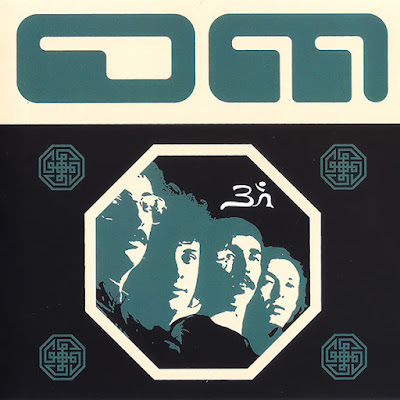1971
Om
01. Excusa 6-8 (12:21)
02. No ho sap ningu (6:23)
03. Zitro's Ache (5:33)
04. Excusa Num.1 (12:54)
05. Vindra La Llum (4:30)
06. Waiting of Godot (4:36)
Martí Soler: Keyboards, Percussion
Toti Soler: Guitar, Percussion
Peter Hodgkinson: Drums
Romà Escales: Flute
Jordi Sabatés: Piano
Jordi Llorens: Sax
Manolo Elías: Bass
Xavier Garcia: Trumpet
Tim Hodgkinson: Trumpet, Saxophone, Flugelhorn
02. No ho sap ningu (6:23)
03. Zitro's Ache (5:33)
04. Excusa Num.1 (12:54)
05. Vindra La Llum (4:30)
06. Waiting of Godot (4:36)
Martí Soler: Keyboards, Percussion
Toti Soler: Guitar, Percussion
Peter Hodgkinson: Drums
Romà Escales: Flute
Jordi Sabatés: Piano
Jordi Llorens: Sax
Manolo Elías: Bass
Xavier Garcia: Trumpet
Tim Hodgkinson: Trumpet, Saxophone, Flugelhorn
Om - led by superb catalan guitarist Jordi ‘Toti’ Soler after his previous band Pic- Nic split- were one of the most interesting outfits to ever come out from Barcelona. Starting in 1968, their first recordings were done as a backing group for other artists like folk- singer Maria del Mar Bonet or american hippie Joe Skladzien, but most notably Pau Riba whom they backed on his debut LP the legendary Dioptria, one of the finest pieces of european psych ever. During all their early work, the band benefited from the organ playing of one of the most talented catalan pianists, Jordi Sabatés (of Ocells del més enllà fame) as well as the musical talents of two english brothers: drummer Peter Hodgkinson and his brother Tim on sax and keys (this is, of course, the same Tim Hodgkinson who founded Henry Cow, together with Fred Frith).
By the time they released their LP on Edigsa in 1971, Om was already an experienced band, with important studio work on their back and countless gigs, having backed american blues- man Taj Mahal in his Madrid 1969 concerts. One particularity of Om was that, rather than having an established line- up, they worked as a musical concept where it was not so important the individuals playing as it was the resulting sound. Their only LP shows how, through the works of Miles Davies, Gary Burton and John McLaughlin, they had developed their sound from its original psych/folk- rock beginnings to an intensely psychedelic jazz rock fussion. A classic album that is hardly known outside Spain and ranks amongst the best of the era, sharing shoulders with similar underground european experiments by Min Bul, Colhemec Ensemble, Xhol, Dharma Quintet, Sunbirds, Full Moon Ensemble or the more progressive output of the british jazz of the era: John Surman’s Trio, Nucleus or Michael Gibbs.
Strictly limited to 500 copies - High quality gatefold sleeves reproducing the beautiful Tony Cepuka’s original psychedelic artwork from 1971’s first press on Edigsa - Insert with liner notes by Wah Wah’s Marc Argenter and Fermí Puig – Includes also repro of big Om poster (coming originally with the first copies of the LP) - Bonus 7" single reproducing Om’s single w/ non- LP tracks 'Vindrà La Llum' / 'Waiting For Godot' (actually the only one released under their own name and not as a backing band).


























